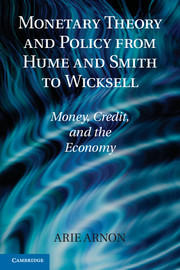Book contents
- Frontmatter
- Dedication
- Contents
- List of Illustrations
- List of Tables
- Preface
- Introduction
- Part one Analytical and Historical Foundations
- Part two Debating Monetary Theory under Inconvertibility
- Part three Debating
- 10 From the Resumption to 1837More Crises
- 11 The Currency School Trio
- 12 The Banking School Trio
- 13 Neither Currency Nor Banking School
- Part four The Road to Defensive Central Banking
- Part five A New Beginning
- Bibliography
- Author Index
- Subject Index
12 - The Banking School Trio
Tooke, Fullarton, and Wilson
Published online by Cambridge University Press: 05 July 2014
- Frontmatter
- Dedication
- Contents
- List of Illustrations
- List of Tables
- Preface
- Introduction
- Part one Analytical and Historical Foundations
- Part two Debating Monetary Theory under Inconvertibility
- Part three Debating
- 10 From the Resumption to 1837More Crises
- 11 The Currency School Trio
- 12 The Banking School Trio
- 13 Neither Currency Nor Banking School
- Part four The Road to Defensive Central Banking
- Part five A New Beginning
- Bibliography
- Author Index
- Subject Index
Summary
Introduction
The Currency School, represented by Loyd, Torrens, and Norman, proposed a significant reform in the banking system, as we saw in the previous chapter. This reform called for a monopoly in note-issuing by the Issue Department of the Bank of England while making the Bank adhere to a strict rule. The Currency School advocated this reform as the only cure for the shortcomings in the monetary regime that manifested themselves in recurring instability and repeating crises. Criticism of the Currency School proposals came from various quarters representing different perspectives; some came from parties that had a clear interest in preserving the status quo, but some came from critics who genuinely challenged the Currency School’s monetary theory. Those whose line of critique was most important and influential in the evolving debate soon became known as the Banking School.
The basic disagreements between the two schools became clear in the early 1840s: The Currency Principle, shorthand for the theory advocated by the Currency School, was rejected by the critics. This principle provided the rationale for the Currency School’s call for a major reform in the banking system, which was naturally rejected as well. In fact, recognizing those who rejected both the Currency Principle and the reform is a common way of defining the group of scholars who were later labeled the Banking School. These scholars questioned the Price-Specie-Flow mechanism, the mechanism that was at the heart of the Currency Principle and that, as we have seen, was accepted with some modifications by Hume, the Bullionists, and now by the Currency School.
- Type
- Chapter
- Information
- Monetary Theory and Policy from Hume and Smith to WicksellMoney, Credit, and the Economy, pp. 209 - 248Publisher: Cambridge University PressPrint publication year: 2010



